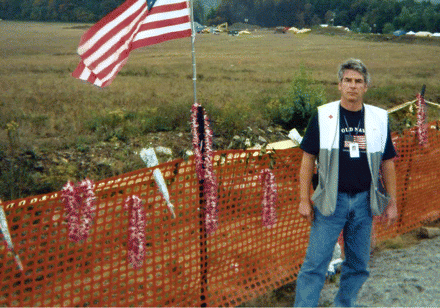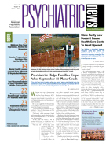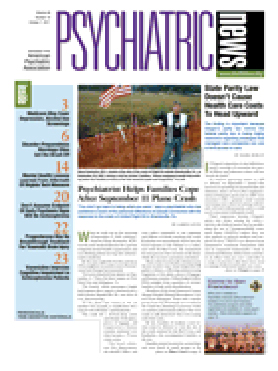When he woke up on the morning of September 11, 2001, child psychiatrist Glenn Kashurba, M.D., was the state medical director for a private nonprofit mental health organization and was thinking about moving into administrative medicine.
By the time night fell, his life and those of his neighbors in southwestern Pennsylvania had changed permanently.
Terrorists hijacked four planes on September 11. Three hit their targets in New York City and Arlington, Va.
The fourth, whose passengers fought back against their captors, slammed into a field outside Shanksville, Pa., just after 10 a.m. that morning.
"If the plane had stayed in the air another five seconds, it would have hit a school with 500 kids," said Kashurba.
The crash left a 10-foot-deep crater and chunks of the plane, pieces of luggage, and fragmentary human remains scattered over what became a 70-acre crime scene.
The local volunteer fire department, the sheriff's office, and state police responded to the explosion and billows of smoke marking the crash. Kashurba was immediately drawn into the local response to the disaster as a volunteer with the Red Cross. He maintained his own practice but cut back on the hours while the recovery operation continued.
Many other local people volunteered at the site in other ways. Some helped the FBI gather evidence, collecting and processing fragments of the plane, pieces of luggage, and human remains. Others helped collect DNA samples from members of victims' families to help with identification.
Members of the local Somerset County Mental Health/Mental Retardation Critical Event Response Team and a similar group from the Pittsburgh area worked at the crash site, listening to recovery workers and law enforcement officers who were ready to talk about how they were coping with their tasks.
By law, families of airplane crash victims must be allowed to visit the site of the crash, assisted by the Red Cross, said Kashurba, who accompanied families to the site.
Families stayed in town for several days and were bused in small groups to the site, perhaps six or eight busloads a day. Kashurba briefed them on what to expect, but his main job was "just to be with them."
The victims' families weren't the only ones burdened by the event.
"The majority of the local people who were involved had some acute stress reaction to the event and its aftermath," said Kashurba in an interview. It sometimes overwhelmed even those, like police, firefighters, or emergency medical personnel, who were used to dealing with disaster.
In retrospect, though, he believes that there have been fewer problems among the local people than he thought that night.
"But the people who were helping out were not themselves victims; they saw themselves as helpers," he said. "Also, in this area it was easier to access natural social supports. The guys at the fire department spent time talking about the experience. There was a natural camaraderie—with ample nonprofessional people to talk about it."
He did see an increase in symptoms for the first few years, mostly in people with preexisting psychiatric problems.
For a year or two, even Kashurba and his brother (a clinical psychologist who shares a practice with Kashurba) and their nurse also spent a lot of time doing "water-cooler therapy" with each other, informally processing September 11 and the weeks that followed.
September 11 may have been more troublesome for adults in Shanksville than for children, because the adults had greater historical knowledge and could comprehend the larger implications of the event, said Kashurba. For children, a more traumatic collective memory was a spate of tornadoes five years earlier, when they had spent a day hunkered down in their basements in fear of imminent physical danger.
"September 11 was a life-changing experience for me and for the area where I live," said Kashurba. He did not go off to earn an M.B.A. and become an administrator. Today he is a child psychiatrist in private practice and a consultant to the private, nonprofit agencies that provide mental health services in rural Pennsylvania. He also gives talks on preparedness and is a trained member of a regional federal Disaster Medical Assistance Team.
He collected the personal stories of people connected with the crash of Flight 93 and published them in a book, Quiet Courage (SAJ Publishing, 2006).
"The crash and its aftermath changed people like combat or police work changes people," he said. "You're happy you've gotten better at things, but it takes its toll in some ways. You don't go back to being what you were."


